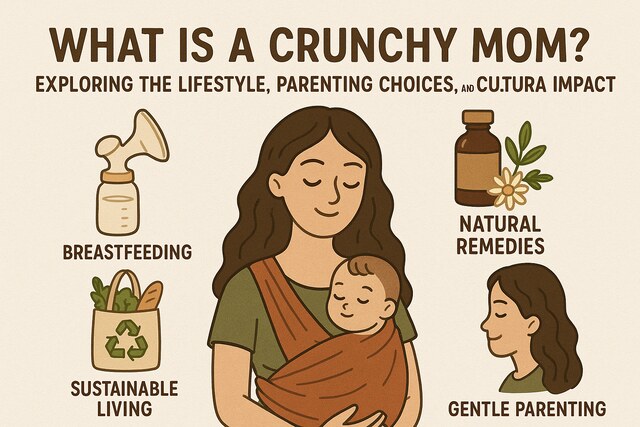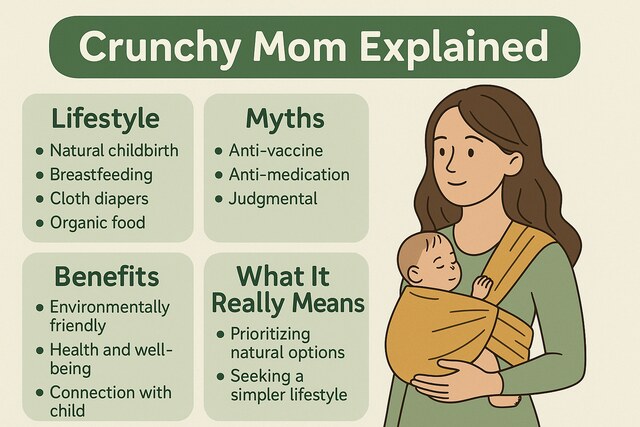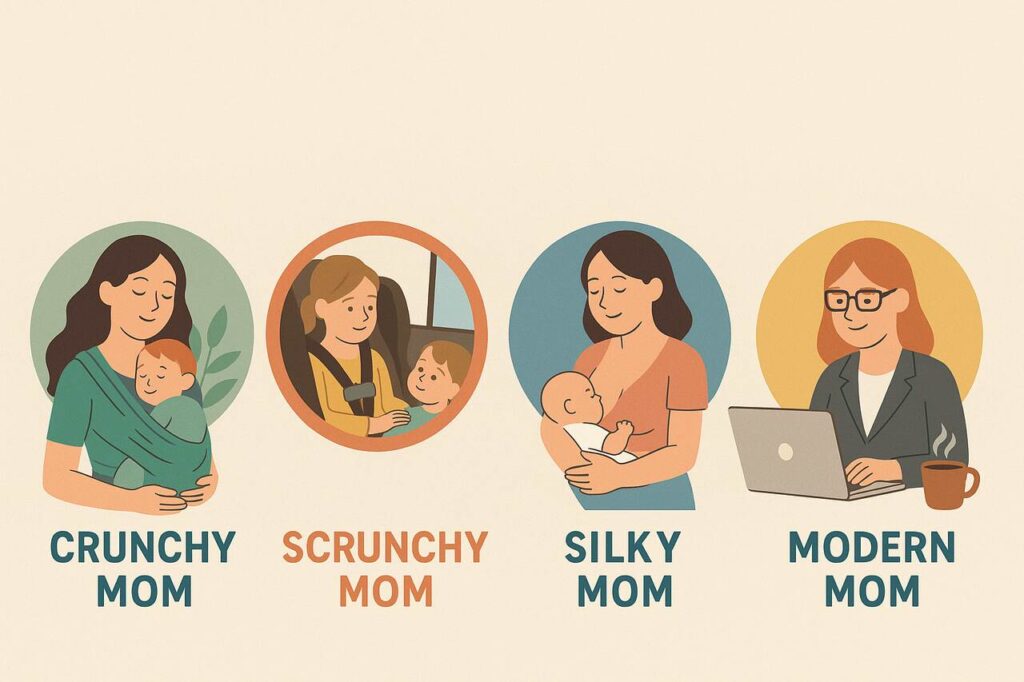Parenting styles shape not only family routines but also broader cultural conversations about health, lifestyle, and values. One term gaining traction in recent years is “crunchy mom” a label often used for parents who embrace natural, holistic living and prioritize eco-conscious, wellness-driven choices. This lifestyle includes practices such as organic food consumption, cloth diapering, natural childbirth, extended breastfeeding, and minimal reliance on synthetic products or pharmaceuticals.
For many, being a crunchy mom is not just about raising children; it is about adopting a worldview that values sustainability, intentionality, and skepticism toward mainstream consumer culture. But the crunchy mom identity also sparks debate some see it as empowering, while others criticize it as impractical or even exclusionary. To understand the nuance, let’s break down what the label means, the practices it involves, and how it compares with other parenting approaches.
Related Article: What Are the Key Signs Stress Is Impacting Your Mental Health?
What Does the Term “Crunchy Mom” Mean?

The phrase “crunchy mom” originates from the idea of eating “crunchy granola,” a stereotype of natural, health-conscious living tied to 1960s and 1970s counterculture. Over time, the expression evolved to describe mothers who actively reject modern conveniences in favor of more natural or traditional alternatives.
A crunchy mom’s core identity is rooted in holistic parenting the belief that raising children should involve conscious choices about food, health, environment, and emotional development. Instead of accepting mainstream advice at face value, crunchy moms often research independently, turn to natural remedies, and embrace community-driven practices such as home birth or babywearing.
The term can be affectionate or mocking, depending on who uses it. Some proudly self-identify as crunchy moms, while others may be labeled as such because of lifestyle decisions that deviate from the norm. Regardless of perception, the label has become a cultural shorthand for a parenting philosophy grounded in nature, sustainability, and intentional living.
What Are the Origins of the Phrase “Crunchy Mom” and How Did It Evolve?
The phrase “crunchy” traces back to the hippie movement, where natural granola diets symbolized resistance to processed food culture. By the 1990s and early 2000s, online parenting forums revived the term, using it to describe mothers who preferred cloth diapers, breastfeeding, and natural health remedies. With the rise of social media, crunchy moms gained visibility as influencers promoting eco-friendly, alternative lifestyles.
Today, the crunchy mom identity spans a spectrum from mildly crunchy parents who choose organic food occasionally, to deeply committed advocates of home schooling, herbal medicine, and toxin-free homes.
Which Core Values and Beliefs Define a Crunchy Mom?

Crunchy moms typically value:
- Sustainability → choosing eco-friendly alternatives and reducing waste.
- Natural health → preferring herbal remedies, essential oils, and limited use of pharmaceuticals.
- Holistic parenting → attachment parenting, babywearing, co-sleeping, and gentle discipline.
- Food integrity → prioritizing organic, local, or homemade meals.
- Skepticism toward institutions → questioning mainstream healthcare, corporations, and government regulations.
These beliefs tie into broader cultural trends, such as the wellness movement and environmental activism. For many families, adopting crunchy values provides a sense of control in a world dominated by processed goods, digital distractions, and institutional authority.
What Behaviors or Practices Are Common Among Crunchy Moms?
Crunchy moms follow natural living through consistent daily habits rooted in wellness, sustainability, and conscious parenting. Common practices include extended breastfeeding, cloth diapering, home birthing, co-sleeping, and using organic or homemade products. They often choose holistic healthcare, eco-friendly lifestyles, and alternative education like homeschooling. These behaviors reflect a deeper commitment to nature-aligned parenting, low-tox living, and emotional connection with their children.
How Do Crunchy Moms Approach Childbirth and Infant Feeding?
Many crunchy moms prefer natural childbirth avoiding unnecessary medical interventions and often choosing midwives, birthing centers, or home births. Water births and doula support are also popular within this community.
For infant feeding, crunchy moms tend to embrace extended breastfeeding, sometimes nursing toddlers well beyond infancy. Breastfeeding is seen not only as nutrition but also as emotional bonding. Alternatives such as homemade baby food, baby-led weaning, and avoiding processed formula (when possible) are also common.
This focus reflects a broader attachment parenting philosophy, where physical closeness and natural methods of care are prioritized to foster emotional security.
What Choices Do They Make Regarding Healthcare and Medicine?
In healthcare, crunchy moms often lean toward preventative and holistic approaches. They may use:
- Herbal medicine (teas, tinctures, salves).
- Essential oils for common ailments.
- Chiropractic care for infants and mothers.
- Selective or delayed vaccination schedules.
While not all crunchy moms reject modern medicine, many exercise caution, seeking natural remedies first and reserving conventional treatments for emergencies. This can be controversial, especially in public health discussions, but reflects a belief in minimizing synthetic interventions.
How Do Crunchy Moms Handle Food, Diet, and Nutrition for Their Children?
Food choices are central to crunchy parenting. Practices often include:
- Buying organic produce and grass-fed meats.
- Cooking homemade meals instead of relying on packaged foods.
- Avoiding refined sugar, preservatives, and additives.
- Exploring plant-based diets or raw food lifestyles.
For crunchy moms, food is both nourishment and activism a way to support ethical farming, local economies, and children’s long-term health.
What Eco-friendly, Sustainable Practices Are Typical in the Crunchy Mom Lifestyle?
Crunchy moms often implement eco-conscious practices at home, such as:
- Cloth diapering instead of disposables.
- Using non-toxic cleaning products or DIY solutions (vinegar, baking soda).
- Prioritizing wooden, non-plastic toys.
- Reducing waste through recycling, composting, and minimalism.
These choices reflect both environmental values and a commitment to creating a toxin-free household. For many, the crunchy lifestyle represents a fusion of parenting and activism, where raising children aligns with protecting the planet.
How Does a Crunchy Mom Compare With Other Parenting Styles?
The crunchy mom differs through her strong focus on natural living, holistic wellness, and low-intervention parenting. Compared to silky moms who trust modern medicine, formula feeding, and conventional products crunchy moms prefer organic, non-toxic, and ancestral methods. Scrunchy moms blend both styles, choosing natural options where practical but embracing convenience when needed. These distinctions highlight lifestyle values, healthcare choices, and parenting philosophies.
What is a Silky Mom, and How is It Different?
A silky mom embraces modern conveniences and mainstream medical advice. This might include:
- Formula feeding instead of extended breastfeeding.
- Using disposable diapers for practicality.
- Relying on pediatricians and standard vaccination schedules.
- Accepting technology (TV, tablets, baby monitors) as part of family life.
Silky moms prioritize efficiency, convenience, and trust in institutional authority. This contrasts sharply with the crunchy mom ethos of skepticism and naturalism.
What is a Scrunchy Mom Somewhere in Between?
A scrunchy mom blends crunchy and silky approaches. For example, she might:
- Breastfeed but also use formula when needed.
- Cloth diaper at home but switch to disposables for travel.
- Cook organic meals but occasionally rely on convenience foods.
This hybrid model reflects the reality for many families striving for natural parenting while acknowledging modern life’s demands. The scrunchy identity resonates because it allows flexibility without guilt.
Comparison Table: Crunchy vs Silky vs Scrunchy
| Attribute | Crunchy Mom | Silky Mom | Scrunchy Mom |
| Feeding | Extended breastfeeding, homemade baby food | Formula feeding, convenience foods | Mix of both approaches |
| Diapering | Cloth diapers | Disposable diapers | Combination of both |
| Healthcare | Natural remedies, selective medicine | Mainstream pediatric advice | Balanced use of both |
| Tech Use | Minimal screens, natural play | Open use of technology | Controlled, moderate use |
| Lifestyle | Eco-friendly, sustainable | Convenience-focused | Flexible, situational |
What Are the Benefits and Positives of Being a Crunchy Mom?
Crunchy parenting promotes long-term health, emotional bonding, and sustainable living. Families benefit from reduced exposure to toxins, stronger parent-child attachment, and personalized healthcare. Community impact includes environmental awareness, local economy support, and reduced medical system strain. These practices foster resilience, autonomy, and conscious decision-making in children and parents alike.
How Can This Style Foster Stronger Parent-child Bonding and Healthier Lifestyles?
Attachment-based practices like co-sleeping, babywearing, and extended breastfeeding foster emotional closeness. At the same time, emphasis on organic food, outdoor play, and reduced exposure to toxins may contribute to healthier development. Many parents report that these practices lead to more mindful, present parenting.
What Environmental or Ethical Upsides Exist?
By choosing eco-friendly products and reducing waste, crunchy moms contribute to sustainability and environmental health. Supporting local farms, avoiding fast fashion, and reducing plastic consumption align parenting with global ethical concerns. This lifestyle reflects a values-driven approach, where raising children becomes a form of activism.
What Are the Challenges or Criticisms of the Crunchy Mom Lifestyle?
The crunchy lifestyle faces challenges like social judgment, limited access to natural products, and higher costs. Critics often label it as impractical, privileged, or anti-science due to skepticism toward conventional medicine. Balancing ideals with real-world demands can create stress, isolation, or parental guilt. These hurdles test consistency, accessibility, and emotional resilience.
Are There Risks or Downsides (E.g. Cost, Social Isolation, Misinformation)?
- Cost: Organic food, natural remedies, and eco-friendly products can be expensive.
- Time: Cloth diapering, cooking from scratch, and DIY remedies require labor.
- Accessibility: Not all families have easy access to natural alternatives.
- Information overload: Conflicting advice online can overwhelm new parents.
In extreme cases, avoiding medical care in favor of unproven remedies can pose health risks to children.
How Do People Criticize the Label or Its Extremes?
Critics argue that crunchy parenting can:
- Promote judgmental attitudes toward other parents.
- Encourage anti-science thinking if taken to extremes.
- Create unrealistic expectations of perfection.
These criticisms highlight the importance of balance, inclusivity, and evidence-based decision-making.
Is the Crunchy Mom Lifestyle Practical Everywhere?
The practicality of the crunchy lifestyle varies by geography, income, and resource availability. Urban areas may offer organic markets and birth centers, while rural regions may lack access. Financial limitations can restrict choices like natural products or midwifery care. Cultural norms and healthcare systems also influence how easily crunchy practices can be adopted.
How Accessible Are Organic/Natural Alternatives in Different Regions?
- Urban areas: Access to organic stores and eco-friendly products is easier, but often expensive.
- Rural areas: Families may already live closer to nature, but organic certification or natural product availability can be limited.
- Developing countries: Traditional lifestyles may already align with crunchy values (e.g., home cooking, herbal remedies), but access to certified organic goods may be rare or unaffordable.
How Can Someone Incorporate Crunchy Practices Without Going “all-in”?
Parents can adopt a hybrid approach by prioritizing what matters most. For example:
- Buying organic produce only for the “dirty dozen.”
- Using cloth diapers part-time.
- Combining natural remedies with modern medicine.
This flexibility prevents burnout and makes the lifestyle accessible to a wider range of families.
How Can Parents Decide What Works for Their Family?
Parents should assess their values, resources, and lifestyle goals before adopting crunchy practices. Decision-making involves balancing intuition, evidence, and practicality. Evaluating emotional needs, financial limits, and local access helps align parenting choices with family dynamics. Flexibility allows parents to adopt what resonates without pressure for perfection.
What Questions Should You Ask Yourself if Considering a Crunchy Path?
- What are my core values health, environment, bonding, convenience?
- How much time, money, and energy can I realistically commit?
- Am I open to a flexible approach rather than strict adherence?
How to Find Balance (if Leaning Crunchy but Wanting Convenience)?
Many parents find balance by choosing a scrunchy approach, where crunchy values guide decisions but modern conveniences fill gaps. This prevents guilt while still aligning with holistic goals.
-when to Consult Medical Professionals Versus Holistic Practices?
It is essential to consult pediatricians for serious health concerns. Holistic remedies can complement, but not replace, professional medical care. A responsible crunchy approach integrates nature with science.
Real-World Examples & Stories
Personal stories illustrate the diversity of crunchy parenting.
Case Studies of Moms Who Identify as Crunchy/Partly Crunchy/Scrunchy
- Fully Crunchy: A mom who chooses home birth, cloth diapers exclusively, and homeschools.
- Scrunchy: A parent who breastfeeds and makes homemade baby food but relies on disposables while traveling.
- Transitioning: A mom who starts with conventional parenting but gradually embraces eco-friendly and natural practices.
Common Misconceptions Dispelled by Lived Experience
Many crunchy moms emphasize that they are not anti-science and that the lifestyle is about mindful choices, not rigid rules. Others stress that you can be crunchy without judgment toward different parenting paths.
Conclusion
The crunchy mom lifestyle represents more than parenting choices it embodies a broader cultural identity tied to nature, sustainability, and intentional living. While it offers benefits such as stronger bonding, healthier food, and environmental stewardship, it also comes with challenges like higher costs, time demands, and social criticism.
For many families, the solution lies in flexibility embracing crunchy values where possible, while still leaning on modern conveniences when necessary. Whether fully crunchy, silky, or scrunchy, the most important goal remains the same: raising children with love, care, and values that align with your family’s well-being. and postural shifts, understanding these changes helps parents adapt with confidence, care, and curiosity. For more informative articles related to Mom’s you can visit Mom’s Category of our Blog.
FAQ’s
Not necessarily. Some crunchy moms follow delayed or selective schedules, but many still vaccinate. The key is a cautious approach, not outright refusal.
It can be, especially with organic products. However, DIY solutions, bulk buying, and selective prioritization make it affordable.
Only if parents reject necessary medical care. Balanced crunchy parenting combines natural remedies with evidence-based healthcare.
It’s not all-or-nothing. Many parents identify as scrunchy, blending crunchy and conventional choices.
Yes, but they look different depending on resources. In many traditional cultures, crunchy values are already present without being labeled as such.
Some practices (like breastfeeding and toxin reduction) are backed by evidence, while others lack strong data. Outcomes depend on balance and context.


